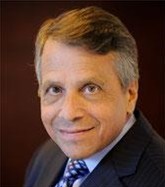James Rigano ’74 has always been passionate about doing what he loves.
If you’re comfortable, go find something else to do. Once you’re comfortable, you’re not moving forward.”

James Rigano ’74
Although Rigano claims to be “the luckiest person alive,” he makes his own luck, consistently learning, seeking new challenges and seizing opportunities.
He discovered his passion for environmental science at Adelphi University and has built a successful, specialized law practice with cases that energize him, tap into his rigorous scientific training and enable him to keep doing what he loves—and loving it.
As a high school student visiting Adelphi from Mamaroneck, his first impression was “love at first sight. It was a peaceful, appealing campus. I’m so thankful that I went to this small liberal arts college that was so very nurturing.”
He met friends in his residence hall whom he would keep for life. “These are the guys I still see regularly and travel with. After all these decades, I still have my buddies!” At the newly constructed Ruth S. Harley University Center, he would also meet his wife, Dorothy (Class of 1976), during one of the campus beer blasts.
Rigano’s parents encouraged him to study computer science, but he soon realized how much he preferred the sciences over technology. Biology classes with College of Arts and Sciences Professor George Russell, PhD, piqued his interest immediately: “From the first day, the first page of the reading, I knew I was hooked,” he says.
Environmental science was brand new at the time, but several significant disasters—oil spills, smog and contaminated rivers—sparked public interest. President Richard Nixon signed environmental protections into law, which supported many new fields of study. “The public demanded change,” Rigano explains. “It was the government and science working together. The public still demands a clean environment. People want clean water, and they want to breathe clean air.”
Rigano loved his classes and aspired to enter the field professionally. “I thought, ‘Yes, that’s for me. That’s what I want to do.’ It was exciting, but also confusing—since this was a new field, there were no jobs.”
Rigano’s early sense that Adelphi professors were nurturing was correct, as two of them helped him get his first job out of college at an environmental consulting firm. He researched the effects of electric power generation and warming waterways for future power plant sites. He earned a master’s degree at night, specializing in marine biology, and then became a biologist, diving deep into radiation’s effect on the plankton population and the larger aquatic ecosystem.
Rigano considered continuing on for a PhD, but instead pivoted and headed to law school. He had worked with attorneys during his time as a biologist, when legal proceedings often required expert testimony. The decision became clear, he recalls, when he realized that as a plankton biologist, he was essentially doing the same thing as a lawyer, and, importantly, “I could have a much better future, financially, as a lawyer.”
During law school, Rigano interned at the U.S. Environmental Protection Agency, and after graduation, used his previous power plant expertise as counsel for the New York Power Authority. “When I graduated, there weren’t many environmental lawyers out there. It was a very, very uncommon thing.” After a few years, Rigano felt the call to enter private practice.
Whether it was luck, timing or both, Rigano was in the right place at the right time when new Superfund legislation was enacted in 1979. Property owners were now responsible for cleaning up any prior contamination—a national sea change that initiated massively expensive cleanup efforts and litigation. He explains, “For me and everybody else that works in the environmental field, Superfund was the big threshold event that finally created substantial job opportunities.”
He joined Rivkin Radler, growing the firm’s environmental law practice from less than a dozen attorneys to more than 50. During this time, he also developed a plan that he still implements, one that ensured his long-term success: As a trained scientist, he consistently writes and publishes, with a paper always in production. He also actively builds his network, organizing conferences and taking on speaking engagements.
Rigano has long been involved with the New York Bar Association and has met with Adelphi pre-law students to share his expertise. His advice is twofold: One, “Look in your soul and decide, what do you really like? As a lawyer, you’re going to spend 90 percent of your time with the facts and 10 percent of the time with the law. So you have to really like the field.” And secondly, he prepares students to get comfortable being uncomfortable. “If you’re comfortable, go find something else to do. Once you’re comfortable, you’re not moving forward.”
Always moving forward, Rigano now heads up his own practice, Rigano LLC, a firm focused on environmental litigation, energy, regulatory compliance and land use matters. A father of four, doing what he loves also includes working with two of his sons and mentoring new attorneys.
“It’s important to pursue what you really love. I really like the environmental field. I decided early that I’m going to do what I want to do and what I really like. You don’t have to have it all figured out. Be open to opportunity,” he says.
Rigano’s success may be partly luck, but it’s also a case study in following a passion, seizing opportunities and working tirelessly for one of the most important causes in human history. “As lawyers, you want to analyze everything and think, but first, you have to look inside yourself. What’s your soul telling you that you love?”
Adelphi granted Rigano more than a degree: It gave him direction, both personally and professionally. He met not only caring professors, but also his life partner and lifelong friends, and he built a foundation at Adelphi that continues to sustain him today.